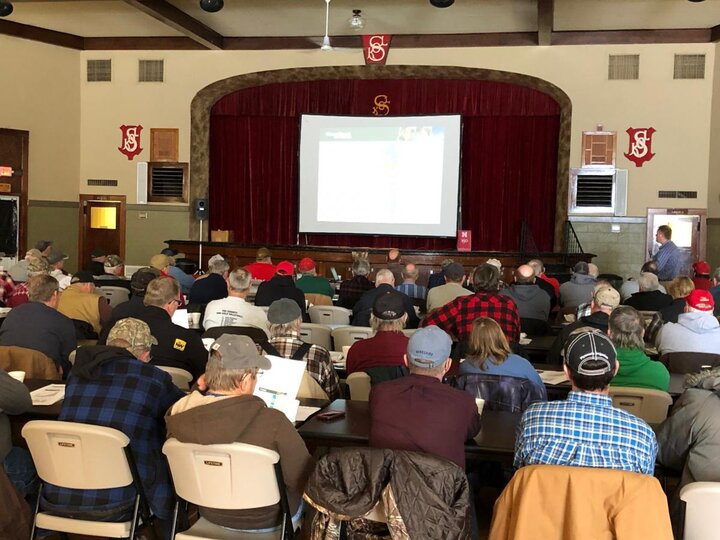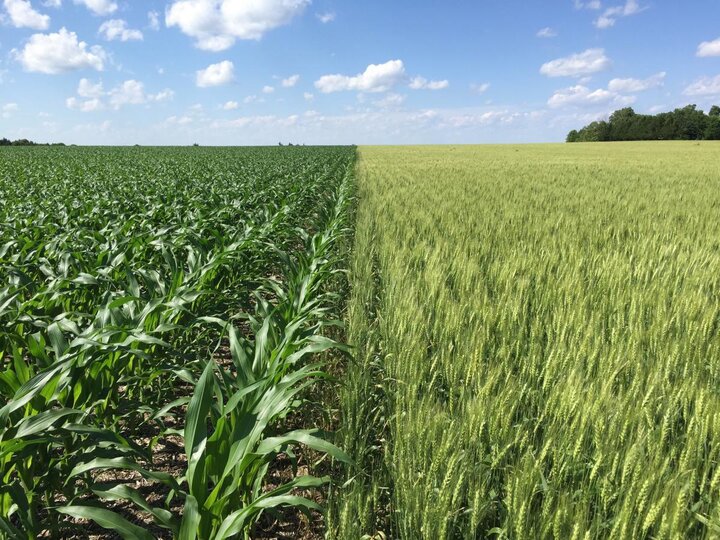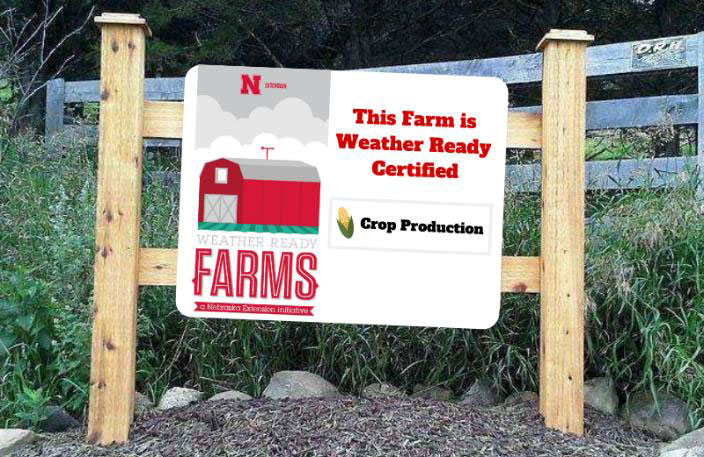The Weather Ready Farms designation program is an agricultural education program aimed at offering farmers new strategies and technologies to prepare for extreme weather events and climate variation.
About the Program
Farmers that participate in the two-year program learn about conservation, natural resource management, improving soil health, disaster preparedness, farm financial management, climate-smart agriculture, and more. Throughout the designation program, participants attend face-to-face and online educational events delivered by Nebraska Extension and our educational partners. After participant’s learn new weather-ready agriculture techniques, participants will work with their project mentors to implement these strategies on their farm. Once participants have completed their education and finished their on-farm projects, participants will go through the Weather Ready Farms verification process to gain designation status as a Weather Ready Farm. If you are interested in participating in the Weather Ready Farms program, contact Eric Hunt at ehunt2@unl.edu.
1. Assessment
3 Months
Participants complete an online self-assessment to determine areas of vulnerabilities on their farms.
2. Education
18 Months
Participants attend a variety of Nebraska Extension programs and partner events, where they learn about new research and ways to implement practices on the farm. Additionally, during the education phase, participants will start projects to improve their overall farm resiliency.
3. Implementation
3-6 Months
After participants complete their education, they will implement at least one project of their choosing that makes their operation more resilient to extreme weather. They will work with extension educators in which project(s) to implement.
4. Verification
2 Months
After participants finish their educational requirements and complete their projects, participants and their project mentors will collaboratively decide to move into the verification phase. An unbiased reviewer will assess the participant’s educational learning plan and their weather-ready projects to determine their completion and quality.
5. Designation
1 Month
Participants who have completed phases 1-3 receive the Weather Ready Farms designation status.
Assessment Phase

At the beginning of the program, participants complete a twenty-to-thirty-minute online survey asking participants about their crop rotation plan, integrated water management strategies, integrated pest management (IPM) scouting and planning; tile drainage control plan; cover crop management plan; nutrient management techniques; windbreak use; soil health management plan; data backup plan; and continuity of operations plan (COOP). The self-assessment allows both the participant and the Weather Ready Farms program team 1) to understand what practices the participant is already doing to reduce the impact of climate variation and extreme weather on the farm, and 2) to develop a learning plan for the participant.
The self-assessment is divided into three tiers:
- Tier 1 encompasses introductory practices to increase farm resilience to extreme weather.
- Tier 2 includes practices that are intermediate in their approaches to increase farm resilience to extreme weather. These practices may require more time and resources to implement.
- Tier 3 includes advanced management practices that are the most time and resource intensive.
- After participants complete their self-assessments, they will have an on-farm assessment with their Weather Ready Farms project mentors. The program mentors, who work with the participant throughout the program, will discuss the self-assessment with participants and fill out their on-farm assessment. After completing the on-farm assessments, the Weather Ready Farms team will collaborate on the participants’ individual learning plans.
Education Phase

Each participant will be required to complete forty hours of education over an 18-month education period. If a participant needs more time to complete the required education hours, they can ask for a six to a one-year extension.
The participant learning plan will list the educational requirements for each participant. Educational recommendations will be based on topic area and areas of vulnerability on each participant’s farm. During the education phase, participants will follow the suggestions in their participant learning plans to attend online and in-person events from Nebraska Extension, relevant UNL departments, and partner organizations.
Participants will then take what they learn during their education to start on-farm projects. The WRF team may make suggestions on the best practices to implement but, ultimately participants are free to pursue the projects they are interested in.
Implementation Phase
After participants complete their education, they will implement at least one project of their choosing that makes their operation more resilient to extreme weather. They will work with extension educators in which project(s) to implement.
Verification Phase

When the WRF team and each participant believe they have completed all the weather ready projects they would like to implement, an on-farm assessment will be scheduled. To limit bias, WRF team members who are not the participants’ project mentors will verify participants’ farms. A reviewer will come to each farm to assess the changes that participants have made according to their individualized learning plans. If the reviewer finds that there is still work that needs to be done, they will offer recommendations for improvement and a follow-up assessment will be scheduled.
Designation

After the verifiers find that each participant has met the goals established in their individual learning plans, participants will earn their designation as a Weather Ready Farms. For participants to achieve designation, they must demonstrate management practices that increase resilience to extreme weather. Examples include:
- If a participant’s initial self-assessment mostly falls in Tier 1, designation is awarded if the participant implements and documents Tier 2 management practices.
- If a participant’s initial self-assessment mostly falls in Tier 2, designation is awarded if the participant implements and documents Tier 3 management practices.
- In the rare event a participant’s initial self-assessment mostly falls in Tier 3, designation is awarded through an agreement of personalized management practices between the participants and the Weather Ready Farms project team.
Upon notification of the designation status, the participant is recognized for accomplishments. Means of recognition may include but are not limited to:
- Farm sign (example shown in Figure 1)
- Feature in local or regional publications or media
- Reception or banquet
- State Ag Day ceremony

Designation Benefits
The benefits for receiving the Weather Ready Farms designation status include but are not limited to:
- Early access to Nebraska Extension, University of Nebraska–Lincoln, and program partners’ educational resources and programs
- Designation signage for the farm and local recognition
- Improved or increased resilience towards the impacts of extreme weather on the farm
For More Information
For more information or questions about the Weather Ready Farms designation program, contact Eric Hunt at ehunt2@unl.edu.